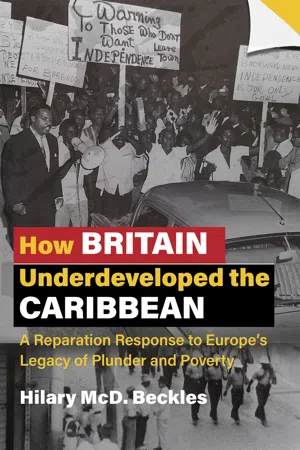
How Britain Underdeveloped the Caribbean
A Reparation Response to Europe's Legacy of Plunder and Poverty
- English
- ePUB (mobile friendly)
- Available on iOS & Android
How Britain Underdeveloped the Caribbean
A Reparation Response to Europe's Legacy of Plunder and Poverty
About this book
"The modern Caribbean economy was invented, structured and managed by European states for one purpose: to achieve maximum wealth extraction to fuel and sustain their national financial, commercial and industrial transformation." So begins How Britain Underdeveloped the Caribbean: A Reparation Response to Europe's Legacy of Plunder and Poverty as Hilary McD. Beckles continues the groundbreaking work he began in Britain's Black Debt: Reparations for Caribbean Slavery and Native Genocide.
We are now in a time of global reckoning for centuries of crimes against humanity perpetrated by European colonial powers as they built their empires with the wealth extracted from the territories they occupied and exploited with enslaved and, later, indentured labour. The systematic brutality of the transatlantic trade in enslaved Africans and the plantation economies did not disappear with the abolition of slavery. Rather, the means of exploitation were reconfigured to ensure that wealth continued to flow to European states.
Independence from colonial powers in the twentieth century did not mean real freedom for the Caribbean nations, left as they were without the resources for meaningful development and in a state of persistent poverty. Beckles focuses his attention on the British Empire and shows how successive governments have systematically suppressed economic development in their former colonies and have refused to accept responsibility for the debt and development support they owe the Caribbean.
Frequently asked questions
- Essential is ideal for learners and professionals who enjoy exploring a wide range of subjects. Access the Essential Library with 800,000+ trusted titles and best-sellers across business, personal growth, and the humanities. Includes unlimited reading time and Standard Read Aloud voice.
- Complete: Perfect for advanced learners and researchers needing full, unrestricted access. Unlock 1.4M+ books across hundreds of subjects, including academic and specialized titles. The Complete Plan also includes advanced features like Premium Read Aloud and Research Assistant.
Please note we cannot support devices running on iOS 13 and Android 7 or earlier. Learn more about using the app.
Information
Table of contents
- Contents
- Acknowledgements
- Prologue
- Origins of Caribbean Underdevelopment
- Introduction
- Chapter 1
- Chapter 2
- Chapter 3
- Black Bloodbaths: Dying for Democracy
- Chapter 4
- Chapter 5
- Plantations Are Forever
- Chapter 6
- Chapter 7
- Chapter 8
- Arthur Lewis: Reparations for Economic Development
- Chapter 9
- Chapter 10
- Punish West Indians, Promote East Indians: The Colombo Plan
- Chapter 11
- Independence: Britain Exits on the Cheap
- Chapter 12
- West Indian Nation-Building, or Cleaning up the Colonial Mess
- Epilogue
- Selected Bibliography
- Illustration Credits
- Index